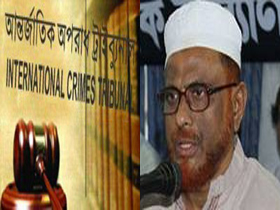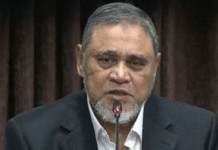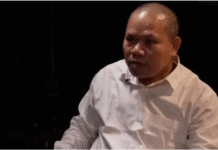The investigator of the war crimes case against detained Jamaat-e-Islami leader ATM Azharul Islam on Sunday said that during investigation he had made inquiries on the information he received.
“I inquired about the information, not of the informant who registered the complaint,” said SM Idris Ali, the designated investigation officer (IO), while facing cross-examination by the defence counsel, A Sobhan Tarafder, before the International Crimes Tribunal-1.
Replying to a defence question, Idris, who was elevated to the IO from constable, told the tribunal he was aware of the provision under the International Crimes Tribunal-1 Rules of Procedure that a copy of allegations has to be served upon the accused at the time of executing the warrant for his arrest.
Asked whether he served ATM Azharul Islam the copy of the allegations made against him while issuing the warrant for his arrest, the IO said: “I didn’t directly provide him with the copy of the allegations, but the content of the allegations was mentioned in the application submitted to the tribunal seeking issuance of warrant for his arrest through the prosecution.
The cross-examination, which remained inconclusive, will resume on Monday.
Earlier, on June 15, while making his deposition, the IO revealed that Islami Chhatra Sangha (ICS), the student wing of Jamaat-e-Islami, had turned into Al Badr, a paramilitary killer force across besieged Bangladesh, which cracked down on the freedom loving, innocent and unarmed civilians, including the intellectuals, in collaboration with the Pakistan occupation army during the Liberation War in 1971.
Accused ATM Azharul Islam, a 1971 president of ICS Rangpur and also member of local Peace Committee (army collaborator) had emerged as district Al Badr Commander, said Idris Ali, adding that the accused had also turned Rangpur College Muslim students dormitory into a makeshift Al Badr torture centre during the entire wartime period.
On November 12, 2013, the tribunal framed charges against Azharul for his involvement in crimes against humanity, including genocide, during the Liberation War, dismissing the discharge plea filed by the accused.
Also a leader of Jamaat-e-Islami, Azharul faces six counts of charges of crimes against humanity during the 1971 Liberation War like killing, abduction, confinement, torture, loot, arson, rape and genocide in Rangpur district.
A week after submitting the formal charge by the prosecution, the tribunal on July 25 took cognisance of the charge against the Jamaat-e-Islami assistant secretary general as it found a strong prima facie case against the accused under subsections 3(2) and 4(1) (2) of the International Crimes (Tribunals) Act 1973.
According to the prosecution case, Azharul had been involved in the killing of more than 1,200 unarmed innocent civilians in Rangpur during the Liberation War in collaboration with the Pakistan occupation army.
It mentioned that Azharul Islam had played a key role in the killing of intellectuals, cultural personalities, physicians and lawyers in different areas of Rangpur during the 1971 war.
On August 22, 2012, police arrested Azharul from his Moghbazar house in the capital in connection with the war crimes case, hours after the tribunal issued a warrant for his arrest following a prosecution plea.
Source: UNBConnect










